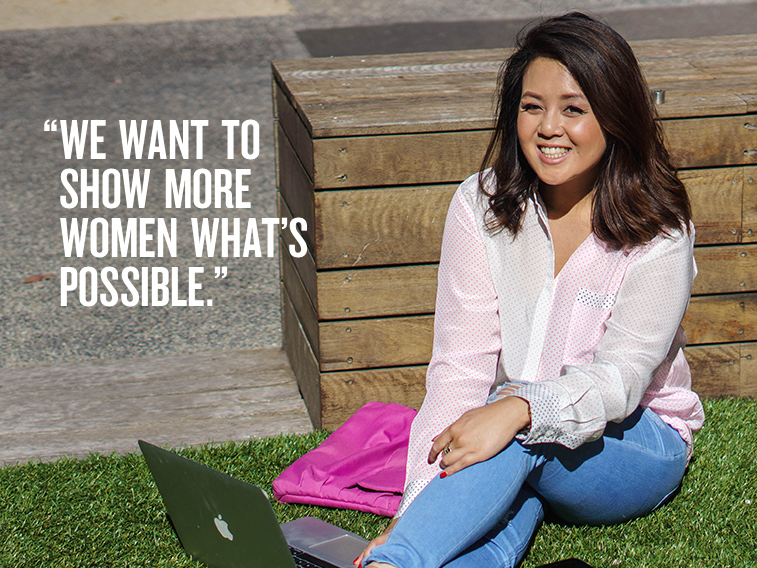RBA surprises with a hold, NAB still sees cuts in August, November and now February


Insight
In 2009, Sheryl Thai had just started a business and was like any other fledgling entrepreneur: hard-working, idealistic, passionate. Yet she felt alone. What she did next became the basis of a movement that’s helped thousands of women across Australia find their business voice: the League of Extraordinary Women.

“In 2009 the GFC hit and I lost my job,” says Sheryl Thai, who trained as an IT consultant but has a self-described “extreme obsession with cupcakes”.
“So I decided to take a chance and start my own business from home. I thought to myself, ‘I’ll give it six months. If it works out, great. If it doesn’t, I can always go back to the corporate world.’” Cupcake Central was born.
It did work out – to the extent that Thai found herself working 18-hour days baking, selling and delivering her beloved cupcakes, and doing it all over again the next day. Within months the business was doing well, but Thai herself felt exhausted and alone.
“It was a really isolating experience,” she says. “Everyone [I knew] was always at work, and I didn’t have anyone to really talk to, didn’t know where to go [for support], and kind of just managed on my own.
“It was probably about 10 months into it that I realised this wasn’t my dream. I was working 18 hours a day, I was exhausted and I couldn’t see a way out. I was just ‘in it’ and working every day. I didn’t know how to scale it and all those sorts of things. So I started going to networking groups.”
It was a move that would mark the beginning of a whole new direction for Thai.
On finding that the groups typically comprised “basically 95 per cent men”, she connected with the few women she did meet through them – fellow business owners also finding the road to successful entrepreneurship a tough one – and began discussing the idea of a networking group just for female business owners.
In 2011, Thai and co-founders including Liz Atkinson-Volpe and Sarah Riegelhuth launched League of Extraordinary Women. From its first in-person networking event, The League has grown to today holding events every six weeks in nine cities across Australia.
Four years ago the founders also established Run the World, an annual all-female entrepreneur conference that this year attracted 400 attendees. And next on the agenda is a massive broadening of their target market: not just female entrepreneurs, but all women with something extraordinary to share.
For Thai, who now juggles her cupcake business with her role as CEO of The League, this expansion is about encouraging more women to back themselves and have faith in their ability to bring their ideas to life and make a business work.
“We started off as young, female entrepreneurs, and then we kind of evolved to just female entrepreneurs,” she explains. “The next stage of The League, which we’ve just rolled out, is to invite all women who are extraordinary to join.
“Women always ask us, ‘Do we need to be an entrepreneur to be part of this community? I want to come along to these meetups and meet other women who are likeminded’.”
In response, The League has a new tagline of ‘Women who connect’, now avoids the term ‘networking’, and instead concentrates its messaging on bringing together women who have a ‘give’ mentality rather than one of swapping business cards or selling. In addition to welcoming all interested women, Thai’s aim is that opening up the group will encourage more women to believe in their ability to become entrepreneurs.
“There’s a whole sort of mentality where they’re like, ‘I don’t know if I’m good enough to be part of it’. I want to eradicate that and just invite everyone, because as long as you fit into the values – where you are generous and giving and wanting to be inspired or inspire others – then I think that’s the really great thing, and this is a great community to be in.”
With connections increasingly taking place through social media rather than in person, Thai says The League uses social media as both a marketing platform and a way to help attendees establish an initial connection before meeting in person. For this reason The League is highly active on Facebook and has some 85,000 followers on Instagram.
“We find that when people start conversations and start following each other, it’s almost like they know each other before they actually meet up in person,” she says. “People will be like, ‘Oh yeah, actually, I follow your account; I feel like I know you’. That opens up the doors to having a deeper conversation than if you hadn’t had that connection previously.”
Deeper connections – and greater confidence to dream big and make those dreams happen – are ultimately what Thai wants for The League, and for all women.
“That was the main reason we created The League – because we wanted to have real conversations,” she says. “I think partly why we created the Run the World conferences is that often people don’t know what’s possible if they don’t see it. The women who speak on stage … they’ve run multimillion-dollar companies where they’ve achieved great success, [but] first of all, most haven’t been invited to speak on stage before, and secondly, sometimes they don’t actually feel worthy of being on stage, which is really quite sad. When we do reach out to them and ask if they want to share their story, they kind of reply with, ‘I don’t know what I’m going to say. I don’t think I’ve achieved enough to share what I’ve been through’.
“We want to show more women what’s possible, so they can go out in the frame of mind, ‘If they can do it, I can too’.”
© National Australia Bank Limited. ABN 12 004 044 937 AFSL and Australian Credit Licence 230686.